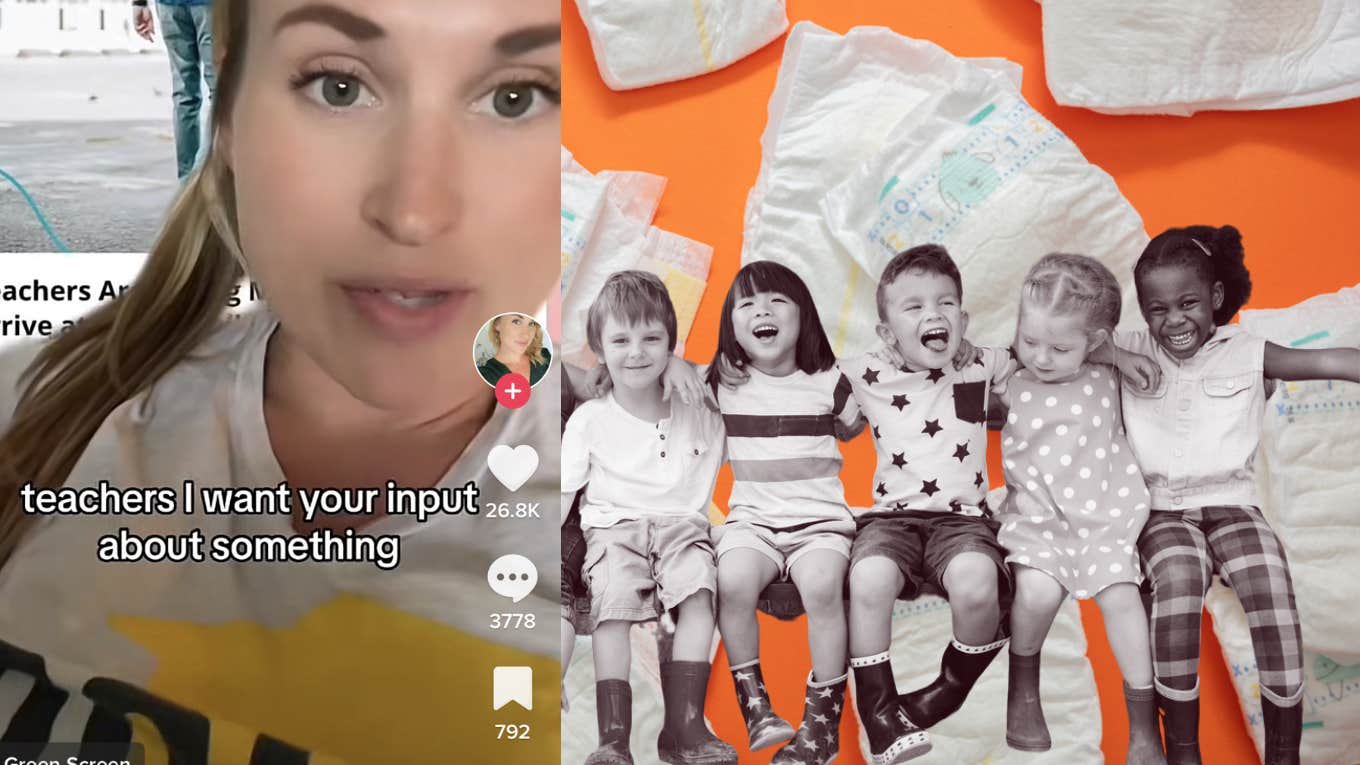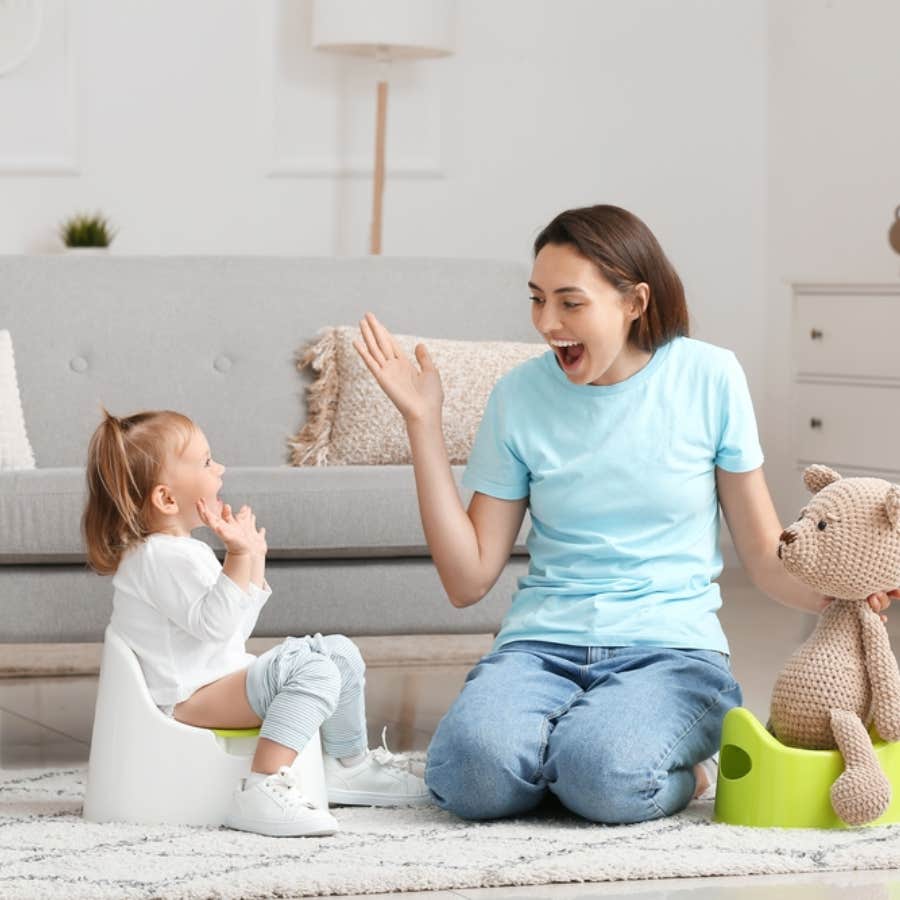Teacher Explains Why More Kindergarteners Than Ever Are Starting School Still In Diapers
Some teachers report that 15-20% of their Kindergarteners are not potty trained.
 Rawpixel.com / rlawf8 / Shutterstock / @maren.theteacher / TikTok
Rawpixel.com / rlawf8 / Shutterstock / @maren.theteacher / TikTok It seems as though the difficulties of teaching elementary school never end for teachers. Between lesson planning, keeping a group of children together and quiet in the hallways, and dealing with parent complaints, the job is certainly not for the weak.
However, it may be more challenging now than ever as diaper changing is added to many kindergarten teachers' ever-growing list of responsibilities.
Kindergarten teachers are realizing that most of their students were never potty trained.
Many teachers are asking themselves, why now?
Up until recently, kindergarten students were fully potty-trained and had been for years, with the exception of the occasional accident. After consulting with parents, teachers were surprised to learn the reasons their children were not potty trained, and why they had no intention of teaching them before they started school.
Many parents disagree with potty training their kids before they express an interest in wanting to learn.
According to UC Davis Health, the average age at which children are fully potty trained is around 36 months (three years old). The process takes an average of six months for children to fully grasp, and girls often learn quicker than boys.
However, children reaching the age of five without being potty trained is now becoming a growing trend. Kindergarten teachers reported to We Are Teachers that 15-20% of their classroom is not potty-trained, and even a few first-graders are still in Pull-Ups. This does not include children who suffer from medical conditions or physical or cognitive disabilities.
A daycare center teacher took to the subreddit, r/Teachers to express concern over the growing number of children being sent off to kindergarten in diapers since the goal is usually to potty train them before they hit four years old.
“My friend just started teaching kindergarten and says she has at least one in a diaper and probably another two in pull-ups,” the teacher wrote. “I cannot fathom this.”
 Photo: Reddit
Photo: Reddit
Teachers flocked to the comments section to share their own experiences and to provide possible explanations for the sudden delay in potty training.
Some of them blamed it on the new parenting phenomenon “gentle parenting,” where parents hope to foster a healthy relationship with their children by validating their emotions and educating instead of punishing and respecting their individuality and feelings. With gentle parenting, some parents believe that it is harmful to force a child to learn how to use the toilet before they express that they are ready.
“My friend in another Texas district had a kid last year (kindergarten) that wasn't potty trained. The mom didn't believe she should force her kid to be potty trained and he'd decide when he was ready,” one Redditor commented.
“I’ve seen some people compare forcing a child to be potty-trained before they are ready to abuse,” another user shared.
“Some parents believe that they are supposed to protect their child from every kind of discomfort, so the minute their child protests they take it as a sign their kid isn’t ready,” another user added.
Other teachers believe that parents are lacking to teach their children basic life skills and habits.
One teacher on TikTok, @maren.theteacher, took to the platform to reveal that she had noticed a “skill discrepancy” among her students, and not just when it comes to potty training. Maren, who teaches third grade, claims that during the previous school year, she had many students without disabilities or developmental delays who still did not know how to tie their shoes or zip their coats.
“They would just stomp their foot at me with laces all over the place and be like, ‘tie this!’” she says. “Teachers know this, there is no time in the day to help 30 kids tie their shoes and zip up their coats.”
Some parents took to the comments section to explain why more and more children were not being taught these simple tasks at home as often as they used to.
“It’s the fact parents have to work two to four jobs to make ends meet and grandparents work as well so there is no one teaching them,” one TikToker commented.
“My five-year-old is potty trained but I think people are genuinely exhausted and stressed out, and we will start to see a hike in this as more work hours increase,” another user suggested.
It is true that parents nowadays are overwhelmed and extremely busy with work outside of their family. Maren posted a follow-up video explaining that her video was not intended to place blame on parents.
However, she encouraged those who have children who are struggling to learn basic concepts to speak with their teachers about it so that they could work as a team to help them grasp these skills.
“Rather than just send them to school and hope for the best, have a conversation, or send a quick email,” she says.
This will only help children pick up the necessary skills that will benefit them as they grow older.
Maren also advises parents and other teachers not to enable “learned helplessness,” which is the concept that able-bodied, developmentally stable children are completely capable of more than they know, but are not motivated to learn new skills.
While it can be difficult, potty training is necessary and takes a lot of trial and error.
It is natural for parents to want to do everything they can to protect their children and shield them from anything that may cause them discomfort. Even the things that do not seem so scary to us can be completely intimidating to a child, and that includes learning new things such as using the toilet.
However, encouraging your children to begin potty training will positively impact their development and overall health.
Psychologist Gwen Dewar, who is familiar with the research of interest to parents and educators, has claimed that potty training your children when they are around 24 months (two years old) will decrease their risk of developing urinary tract infections and rashes since they will spend less time in soiled diapers.
“10 different published studies, addressing a total study population of more than 24,000 children — and the trend was clear. Kids who began training before 24 months tended to enjoy better long-term health outcomes,” she told Parenting Science. “As long as they had initiated training before 24 months — they were less likely to have developed urinary tract problems.”
 Photo: Pixel-Shot / Shutterstock
Photo: Pixel-Shot / Shutterstock
Still, there are some children who will take longer to learn the process, and some who may even grow frustrated and need a break here and there, and that is okay.
Every child’s development and growth is different, and not all potty-training stories will be similar. But having patience, understanding, and sympathy, or being the “gentle parent” you’re determined to be as your child transitions onto this new phase of life will only make your life, and their teachers’ lives, easier down the line.
“The crucial factor isn’t the child’s chronological age. Instead, what’s important is that you choose a time when your child is healthy (free of any urinary tract or bowel troubles) and ready to cooperate,” Dewar added. “And of course, you must make sure that your goals and methods match your child’s developmental capabilities.”
Megan Quinn is a writer at YourTango who covers entertainment and news, self, love, and relationships.

